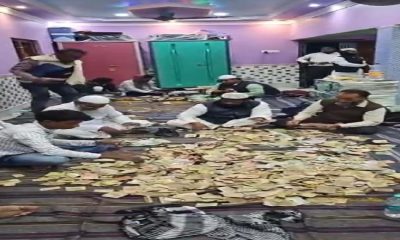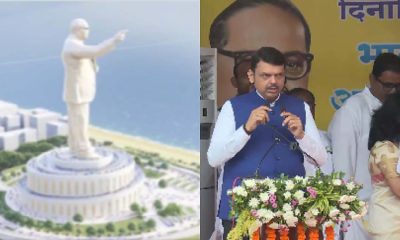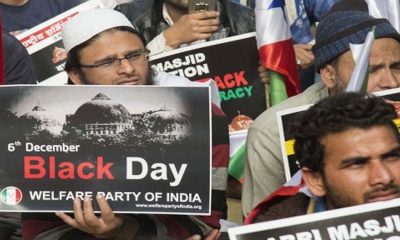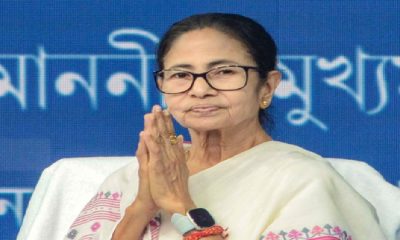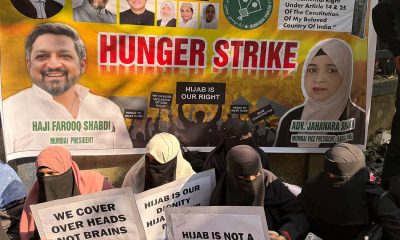National News
PM Modi Inaugurates Ayodhya Dham Station, Flags Off 2 Amrit Bharat Trains & 6 Vande Bharat Trains
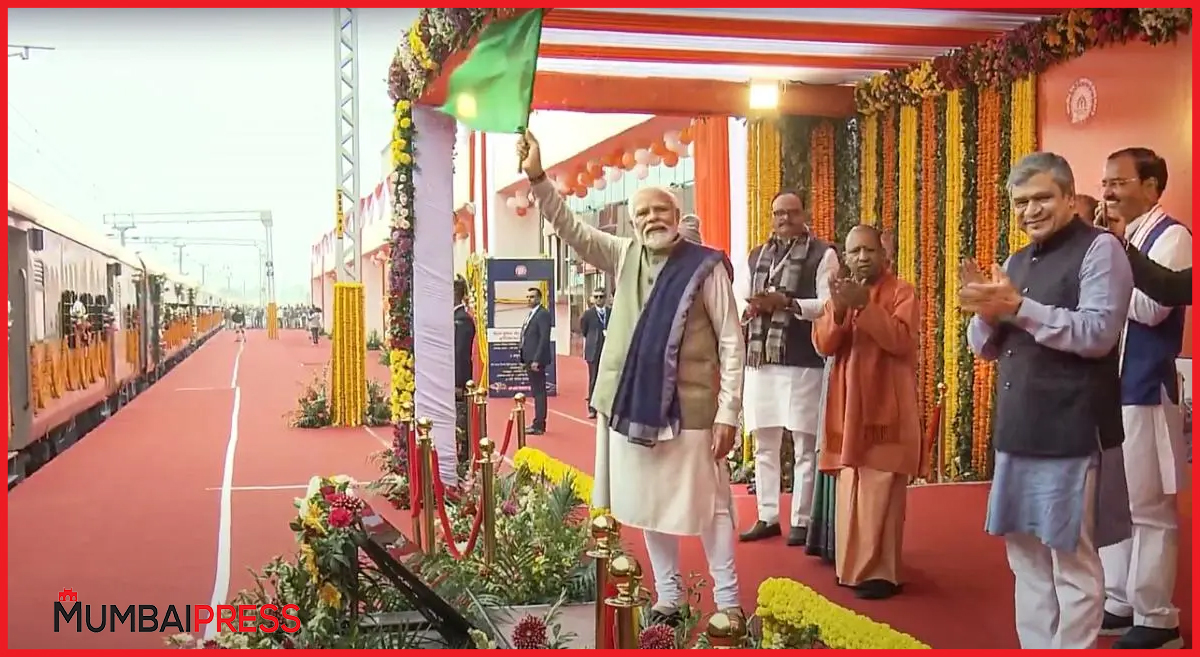
Prime Minister Narendra Modi inaugurated the Ayodhya Dham Junction railway station, in Ayodhya. Uttar Pradesh Governor Anandiben Patel, CM Yogi Adityanath, Railways Minister Ashwini Vaishnaw were also present.
After inaugurating the station, Prime Minister Narendra Modi flagged off two new Amrit Bharat trains and six new Vande Bharat Trains.
While unveiling the Amrit Bharat trains, PM Modi also interacted with students.
PM received grand welcome
Prime Minister Narendra Modi received a thunderous welcome as he landed in the holy city of Ayodhya, with people showering flowers as he took a lap of honour on his way to inaugurate the redeveloped Ayodhya railway station on Saturday.
The city, which is set to witness the consecration of the Ram Temple in January is all decked up with flowers, murals and thematic ornamental columns amid heavy security deployments as PM reached the temple town.
PM Modi is in Ayodya also to inaugurate Maharishi Valmiki International Airport, Ayodhya Dham Airport.
The state of the art airport
Phase 1 of the state-of-the-art airport has been developed at a cost of more than Rs 1450 crore. The airport’s terminal building will have an area of 6500 sqm, equipped to serve about 10 lakh passengers annually. The facade of the Terminal Building depicts the temple architecture of the upcoming Shri Ram Mandir of Ayodhya.
The interiors of the terminal building are decorated with local art, paintings and murals depicting the life of Bhagwan Shri Ram. The terminal building of Ayodhya airport is also equipped with various sustainability features, like an insulated roofing system, LED lighting, rainwater harvesting, landscaping with fountains, a water treatment plant, a sewage treatment plant, a solar power plant and many other such features have been provided to meet GRIHA – 5-star ratings.’
The airport will improve connectivity in the region, leading to a boost in tourism, business activities and employment opportunities.
National News
‘BJP wants to own everything’: Akhilesh Yadav in LS during Vande Mataram debate
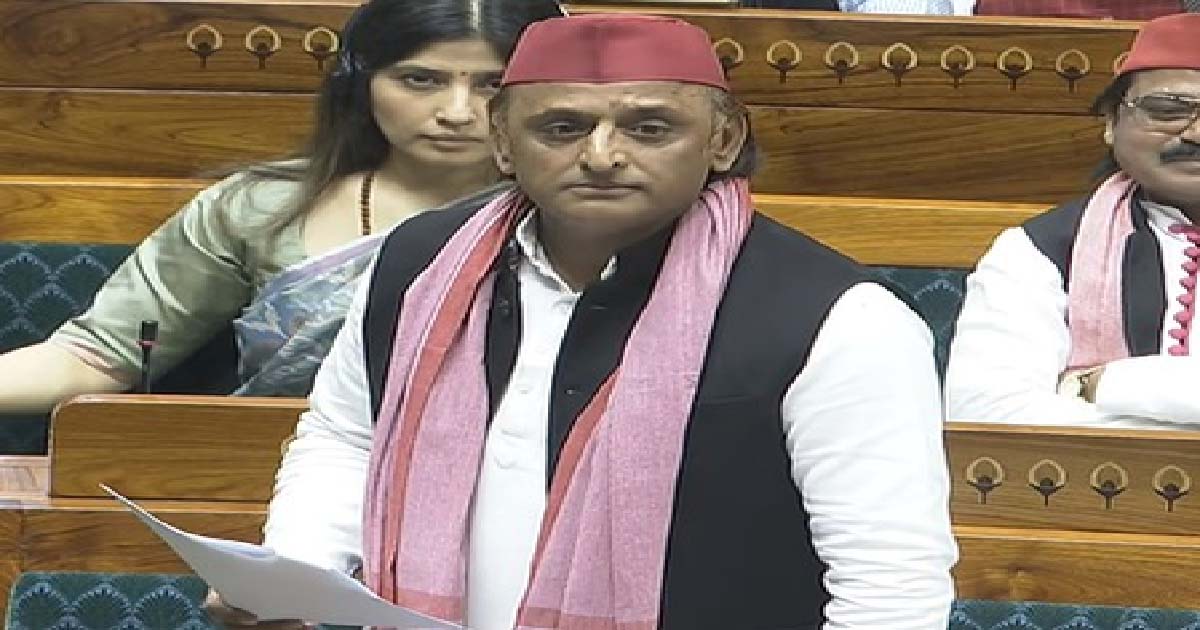
New Delhi, Dec 8: Samajwadi Party chief Akhilesh Yadav on Monday accused the BJP of trying to “own everything and claiming exclusive nationalism”, which was in fact “Rashtra-vivadi (anti-national).”
In his address during a special session of the Lok Sabha to commemorate 150 years of ‘Vande Mataram’, he said the national song belongs to every Indian and cannot be politicised.
Yadav said, “When in Kolkata, Congress leaders and Rabindranath Tagore sang this, it reached the common people, and when people fought against the British, the slogan of Vande Mataram played a major role in uniting them.”
He added, “When the British got panicked by this slogan, they used to put people in prison under anti-national cases. From 1905 to 1908, Vande Mataram was banned by the British, but they were not able to stop our revolution, and our freedom fighters kept taking it forward.”
Targeting the ruling BJP, Yadav said, “The ruling party in our nation wants to own everything. The things they do not have, they want to own. When the organisation was being formed, and the chairman who was chosen, there was debate on whether the BJP would go on the secular path, the socialist path or not. The chairman appointed at that time chose the secular and socialist path. On his stage, using Jaiprakash Ji’s picture, they tried to spread that they would follow his footsteps.”
Urging that Vande Mataram must be understood beyond symbolism, he said,
“Vande Mataram is not just to sing but to act as well. The Vande Mataram, which connected everyone in the independence movement, today, some people are trying to break the nation; they are still trying to do so. Vande Mataram is not a political subject or something to show off, but these BJP leaders act like it’s a song made by the BJP. People who did not take part in the independence movement — how will they know the value of Vande Mataram?”
In one of his strongest lines, Yadav said, “They are not ‘Rashtravadi’ (nationalist); they are ‘Rashtra-vivadi’ (anti-national). Back then, the British used to divide and rule; today, also some people are accepting that path of divide and rule.”
Continuing his criticism, he added, “The truth is that only a few people truly recited Vande Mataram from the heart. Some even worked as spies and informers for the British against those freedom fighters. Vande Mataram is not for fake politics.”
Yadav also accused the BJP of trying to appropriate icons: “Our party ended communal politics from where the BJP started it. They started putting Ambedkar’s picture in their election meetings after facing losses from the SP.”
National News
K’taka Assembly session begins in Belagavi amid tight security; MES activists detained
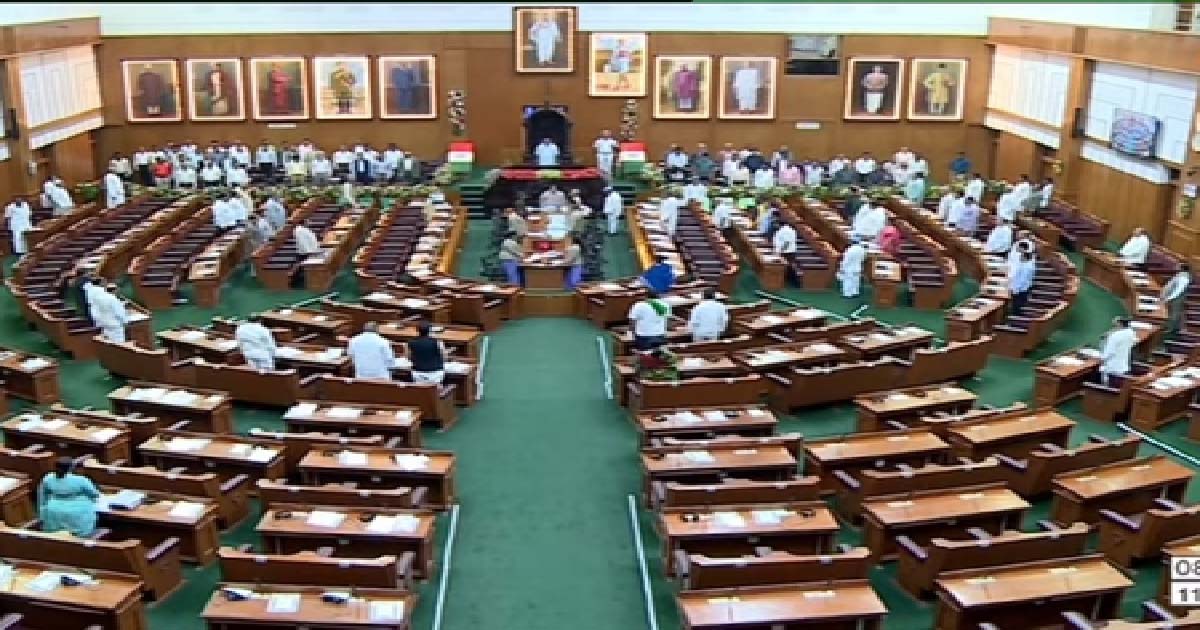
Belagavi (Karnataka), Dec 8: The winter session of the Karnataka Legislative Assembly commenced on Monday at the Suvarna Vidhana Soudha in Belagavi amid tight security arrangements.
The Karnataka Police detained activists of the Maharashtra Ekikarana Samiti (MES) for attempting to organise a convention opposing the Karnataka government’s decision to hold the winter session in Belagavi. The border city of Belagavi has been placed under heightened security to prevent any untoward incidents, as the opposition is planning large-scale protests. The BJP has announced that it will lay siege to the Suvarna Vidhana Soudha on Tuesday (December 9) with thousands of farmers.
The 10-day session will continue until December 19, with more than 30 bills likely to be tabled, including the controversial Bill aimed at containing hate speech.
The opposition parties, the BJP and JD(S), are preparing to corner the government, while the ruling Congress has also readied itself to face the challenges by presenting a united front amid the ongoing leadership tussle between Chief Minister Siddaramaiah and Deputy Chief Minister and state Congress President D.K. Shivakumar.
Amid the internal power struggle, the BJP had initially planned to move a no-confidence motion but has since backed off.
The first day of the session will be limited to condolence references, after which the proceedings will be adjourned.
BJP State President and MLA B.Y. Vijayendra stated on Monday at the Suvarna Vidhana Soudha that the plight of sugarcane farmers, whose crisis continues unabated, must be taken up for discussion.
He said the state government had failed to open maize procurement centres at the appropriate time, forcing farmers to sell maize at just Rs 1,500 per quintal, far below the minimum support price announced by the Centre. The problems faced by farmers cultivating cotton and tur dal must also be discussed, he added.
“Due to the internal tussle within the Congress-led government in Karnataka, governance has collapsed,” he alleged.
The session is expected to draw significant attention due to the changed political scenario, the government’s controversial decisions, and the expectations of people in North Karnataka.
Both the BJP and JD(S) have announced that they will jointly confront the Congress-led government in the Assembly. The opposition has geared up to target the state government by raising key issues and exerting pressure.
Issues related to North Karnataka are expected to be a major focus, with the opposition likely to seek updates on the implementation of promises made during the previous Belagavi session.
The Karnataka Police have detained more than 20 Maharashtra Ekikarana Samiti (MES) activists who had gathered to hold an event demanding that Belagavi be included in the state of Maharashtra. Former Belagavi mayor Malogi Astekar and other MES leaders were among those detained.
The district administration had denied permission for the MES to hold its ‘Mahamelava’ in Belagavi on Monday, but activists gathered near the Vaxi Depot area and attempted to conduct the event. High drama unfolded as police took them into custody, with MES members shouting “Jai Maharashtra” and raising slogans against the Karnataka government.
In another development, workers of the Uddhav Thackeray faction of the Shiv Sena stopped Karnataka State Road Transport Corporation (KSRTC) buses in Kolhapur district of Maharashtra and pasted “Jai Maharashtra” posters on the vehicles. Authorities are closely monitoring the situation and have intensified security in the border areas adjacent to Maharashtra.
Crime
Mumbai ANC Detains Repeat Drug Offender For One Year Under Rare PIT-NDPS Action

Mumbai: In a major preventive action against repeat drug offenders, the Anti-Narcotics Cell (ANC) of the Mumbai Crime Branch has arrested a 29-year-old drug trafficker under the Prevention of Illicit Traffic in Narcotic Drugs and Psychotropic Substances (PIT-NDPS) Act, lodging him in Kolhapur Central Jail for one year.
The accused has been identified as Surajkumar Ramvilas Prajapati (29), a resident of Albert Compound, Vasari Hill, Shankar Nagar, near Rustamjee Tower, Goregaon (West).
While preventive detention of habitual offenders during election seasons is common to avoid threats to law and order, such detentions typically last only a few days and the individuals are released after polling.
However, in a rare and unprecedented move, the Mumbai Police have detained Prajapati for an entire year and shifted him to Kalamba Central Jail, Kolhapur.
The action was taken under the stringent PIT-NDPS Act, 1988, a provision invoked only in exceptional cases to isolate habitual offenders from society.
A senior Mumbai Police officer said a similar action under the PIT-NDPS Act was previously taken against Iqbal Memon alias Iqbal Mirchi, Dawood Ibrahim’s key drug handler. After Mirchi, this is considered the second major preventive detention under the Act in recent years.
According to police, Prajapati has seven ganja trafficking cases registered against him:
Four cases at Malad Police Station
One case at Goregaon Police Station
Two cases with the Kandivali Unit of the ANC
He was recently granted bail in the Kandivali Unit case, but investigations revealed he continued operating in narcotics trafficking despite multiple bail orders.
Given the ongoing threat posed by the accused and his repeated return to drug peddling, the ANC submitted a proposal to detain him under the PIT-NDPS Act to the Competent Authority Principal Secretary (Special), Home Department, Government of Maharashtra.
The proposal was approved, and an official detention order was issued.
Following the approval, Prajapati was taken into custody and on December 6, 2025, lodged in Kalamba Central Prison, Kolhapur, for preventive detention of one year.
-

 Crime3 years ago
Crime3 years agoClass 10 student jumps to death in Jaipur
-

 Maharashtra1 year ago
Maharashtra1 year agoMumbai Local Train Update: Central Railway’s New Timetable Comes Into Effect; Check Full List Of Revised Timings & Stations
-

 Maharashtra1 year ago
Maharashtra1 year agoMumbai To Go Toll-Free Tonight! Maharashtra Govt Announces Complete Toll Waiver For Light Motor Vehicles At All 5 Entry Points Of City
-

 Maharashtra1 year ago
Maharashtra1 year agoFalse photo of Imtiaz Jaleel’s rally, exposing the fooling conspiracy
-

 National News1 year ago
National News1 year agoMinistry of Railways rolls out Special Drive 4.0 with focus on digitisation, cleanliness, inclusiveness and grievance redressal
-

 Maharashtra1 year ago
Maharashtra1 year agoMaharashtra Elections 2024: Mumbai Metro & BEST Services Extended Till Midnight On Voting Day
-

 National News1 year ago
National News1 year agoJ&K: 4 Jawans Killed, 28 Injured After Bus Carrying BSF Personnel For Poll Duty Falls Into Gorge In Budgam; Terrifying Visuals Surface
-

 Crime1 year ago
Crime1 year agoBaba Siddique Murder: Mumbai Police Unable To Get Lawrence Bishnoi Custody Due To Home Ministry Order, Says Report



